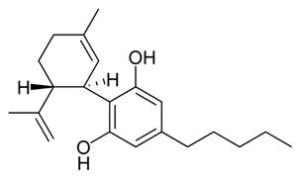Drug War Issues
Health Canada has given final approval for the use of Sativex, a sublingual marijuana extract, for the treatment of spasticity in multiple sclerosis patients, the drug's manufacturer, GW Pharmaceuticals, announced Tuesday. Canada had previously approved Sativex for neuropathic pain in MS patients in 2005 and for pain relief in cancer patients in 2007.

Cannabidiol, one of the two major compounds in Sativex (courtesy Cacycle, wikimedia.org)
The announcement comes as Sativex appears poised for a break-out. Already approved for use in Britain, it received preliminary approval earlier this month in Spain, and the German government announced two weeks ago that it would allow Sativex to apply for approval there. The company said it is also looking to market the drug in other European countries in association with Bayer.
"Following recent approvals in the UK and Spain, Canada is now the third major country to approve Sativex for symptomatic relief of spasticity in adult patients with MS," said Dr. Steven Wright, GW's research and development director. "This regulatory approval has come several months earlier than anticipated and GW looks forward to working with Bayer to develop the marketing strategy for this new indication."
This work by StoptheDrugWar.org is licensed under Creative Commons Attribution-ShareAlike 4.0 International
Comments
Sativex, marinol etc.
In reply to Sativex, marinol etc. by jj (not verified)
Serving Two Masters
Please excuse wholesale cut and paste - laziness in avoiding paraphrasing. It's a fascinating article - an excellent review - which I would recommend to anyone (and everyone): http://www.denverlawreview.org/medical-marijuana/
"In the U.S., GW insists that their lead product, once it completes the necessary number of clinical trials and wins FDA approval for the indication of cancer pain refractory to opioid therapy, should be placed in a lower Schedule separate from herbal cannabis, which should itself remain in Schedule I. In a 2005 letter to the United States Department of Health and Human Services, that GW Pharmaceuticals distributes at public relations appearances, they boast of their UK license to cultivate various cannabis strains. This author has been told by an anonymous GW employee that the exclusive license was made possible because of Chairman Guy’s personal relationship with former British Prime Minister John Major, who helped broker the company’s exclusive deal with the Home Office. They argue that their lead product, proprietary name Sativex®, is “quite different” from “generic and unrefined cannabis” and that “it cannot be said that all cannabis—or all cannabis extracts—are the same.” Finally, not wanting natural cannabis to share in any of their predicted future legitimization of their extract, they end by saying that “it would be a great irony if generic herbal cannabis were to be removed from Schedule I of the Controlled Substances Act, and made available for general medical use, based in part on data relating to a specific product [Sativex®].” Is not the real irony that GW would have the plant on which their entire company is based, relegated to the status of irredeemably dangerous drug, while their extract of the plant is blithely elevated to the status of profitable, salable good?[13] Is that any way to thank Mother Nature?"
Just one thought: God sees everything! (Matthew 6.24)
Sativex, mainol etc.
In a perfect world, people would pay there taxes with marijuana.
Yes, seems that the Big
Yes, seems that the Big Business is getting their way again thanks to government. How long before the USA does the same thing and tries to tell us that this man-made product is better for us than the organic product is it made from?
Add new comment